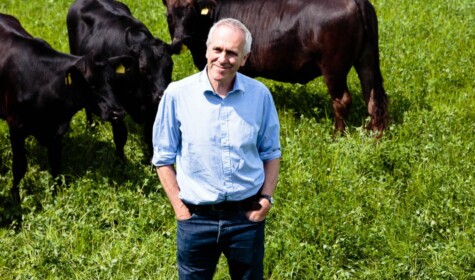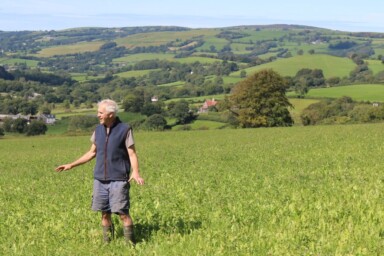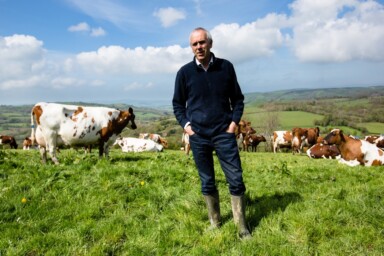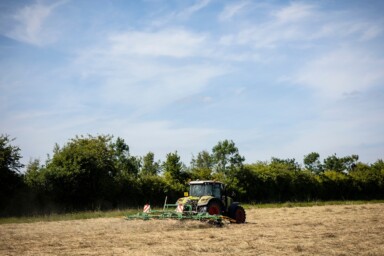Following the UK Government’s recent publication of details for the new ELM farm subsidy scheme for England and its Environment Improvement Plan, our CEO, Patrick Holden, takes a moment to reflect upon the situation facing farmers today and the direction in which we need to be heading.
I don’t know of a single farmer in the UK who wouldn’t, in their heart, prefer to shift to a more nature and climate-friendly system, yet ultimately, it has to be about financial viability. Is there enough money in Defra’s rejigged Sustainable Farming Incentive to encourage and enable farmers to make the shift? Unfortunately, the sums don’t stack up and the conclusion that many farmers will arrive at is a resounding ‘no’.
Most will likely stick with their current approach, while claiming what they can from Defra’s ‘pick-and mix’ menu of subsidies. In trying to navigate the available support, farmers will be forced to try to make up what they lost in the single farm payment, by planting the edges of otherwise intensively farmed arable fields with wildflower mixtures, perhaps recovering a bit more money by adding pockets of woodland elsewhere on their land.
What a missed opportunity! In 2016, when we voted to leave the EU, Michael Gove called on us to maximise the positive potential of this ‘unfrozen moment’ for farming – a welcome acknowledgement of the bigger picture. His mantra was ‘public money for public goods’ and many of us were greatly encouraged by the potential for redesigning food and farming subsidies to make them fit for purpose. Since Gove was moved from the department, hundreds of civil servants have been left without clarity or direction.
Seven years have now passed. If we pause to ask ourselves what meaningful progress there has been, the answer stares resolutely back at us: extremely little. The plethora of non-announcements has left farmers understandably confused, while post-Brexit trade deals stand to open the floodgates to cheaper food produced to lower standards. Simultaneously, the Climate Change Committee’s current ‘land sparing strategy’ runs the risk of driving us even further from the direction in which we should be heading. There could have been a concentrated effort to lay the groundwork for a widescale shift to agroecological systems, rewarding genuinely sustainable practices on a per acre basis. Instead, the current approach is only serving to perpetuate the disorientation and turmoil that is blighting our farming communities.
Many farmers are striving to make the best of the situation, looking to maximise opportunities to combine funding from Countryside Stewardship and ELMs, yet government cohesion is lacking when it comes to defining the future that we want to achieve for our food and farming sector and designing a subsidy system that underpins it. One of the details notable for its absence is how Defra plans to monitor the various sustainability measures outlined in its new subsidy schemes. Effective monitoring will be essential and is something that we have been focussing on through the Global Farm Metric – a holistic framework that we are developing in collaboration with farmers and other stakeholders to understand, measure and monitor the state of farming systems globally, independent of any particular farming philosophy.
So, given the somewhat bleak picture I’ve now painted, how can I stand and say with conviction that we can achieve a better way forward? The answer is that for the past 50 years, I have been putting sustainable farming principles into practice on my 300-acre farm in West Wales. During that time, I have witnessed first-hand that farming in harmony with nature can produce adequate quantities of high-quality, nutrient dense food whilst at the same time addressing climate change and restoring biodiversity. There is some hope in that the Welsh Government’s proposed Sustainable Farming Scheme, whilst imperfect and still likely to suffer from the lack of funding, might be better placed to support the transition to sustainable farming in Wales, as it is based on more of a whole-farm approach.
I also find great encouragement in the progress of our work at the Sustainable Food Trust to create a policy, economic and cultural environment that supports sustainable food and farming. Through our focus on unlocking the barriers to change, we are showing that regenerative farming systems can deliver profound benefits for climate, nature and health, all while maintaining, and potentially even improving upon, current levels of self-sufficiency in the UK. There remains the sobering reality that we have less than a decade to make meaningful progress in addressing the existential challenges of climate change and nature recovery; well-managed reform of our food and farming system lies at the heart of both.
Click here to read more about the ways that we are working to accelerate the transition to more sustainable food and farming systems that nourish the health of both people and planet.







